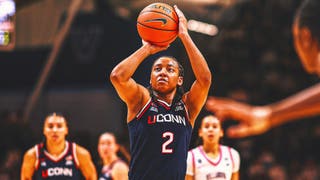Having signed a crisp new contract with the Philadelphia Union of Major League Soccer, Freddy Adu is returning stateside after four years of European pinballing. But don't call it a comeback. No, seriously, that's the last thing he needs.
In order to succeed in Philadelphia, the 22-year old journeyman needs to be treated like the promising young player he is, with raw ability and unpolished offensive prowess, and nothing more. He's not a prodigy, not the next big thing and not the savior of American soccer.
We've been down that road before and it led to a downward spiral that left the former phenom playing in half-empty stadiums in Eastern Europe.
That journey began in unprecedented fashion when, after a smattering of jaw- dropping performances as a United States youth international, Adu made his professional debut for D.C. United against the San Jose Earthquakes on April 3, 2004.
At 14 years old, the Ghana native became the youngest athlete to play in a major American professional league since the 19th Century. What's more, he did so in front of a sellout crowd and national TV audience - a rarity in its own right for MLS.
His rookie contract and endorsements made him the highest-paid player in the league. Despite only accruing five goals and 14 starts, Adu's first professional campaign was successful on all levels: He was the commissioner's pick for the all-star game, co-starred in a commercial with Pele and won the MLS Cup.
But amid reports of clashes with then United boss Peter Nowak - who, ironically, is now at the helm in Philadelphia - Adu was transferred to Real Salt Lake in December 2006. That stint was short-lived, however, as a solid showing in the FIFA Under-20 World Cup the following summer drew a long- awaited offer from Europe.
Adu packed his bags, bound for Portugal to play for perennial powerhouse Benfica. Unfortunately, that didn't happen, at least not nearly as much as he had hoped. He struggled to break into the first team and spent most of the last four years on loan bouncing from club to club, each less impressive than the last.
The voyage included stops at Monaco of France, Belenenses of Portugal and Aris of Greece before Adu bottomed out at Caykur Rizespor, a middling Turkish second division team near the Black Sea.
It would be easy to blame Adu's wayward European excursion on the unrelenting hype he generated as a teenager, but his struggles snowballed even as he slipped out of the U.S. player pool and into obscurity.
Until recently, the word "Adu" had all but fallen out of the soccer vernacular, spare the occasional "Much Adu about Nothing" puns used by the mainstream media to portray the fallen icon as soccer's equivalent of Ryan Leaf.
But players with his ability usually bubble back to the surface and there remained an ever-shrinking contingent of soccer fans that thought he could still play at a high level, even if the initial projections were obviously amiss.
Queue the resurrection.
In what was a surprising decision (and perhaps a final and lasting contribution) from soon-to-be-sacked U.S. national team coach Bob Bradley, Adu was named to the Gold Cup roster earlier this summer.
In phoenix-like fashion, Adu rose from the ashes to set up the game-winning goal in a semifinal grudge match with Panama and proved to be one of the few bright spots in a 4-2 loss to Mexico in the final.
Those performances induced knee-jerk reactions from nearly everyone who had written him off - "We were right all along!" - and paved the way for his return to MLS.
If there's a tell-tale indicator of Adu's European toils, it's that he drew a $2 million transfer fee from Benfica and returned, tail somewhat tucked between his legs, on a free transfer. But if there's a sign of promise, it's that the hard-nosed Nowak saw enough maturation to make him a high-profile signing once again.
Adu's Gold Cup magic came because it was no longer demanded. He was neither the feature presentation nor a far-flung hero of yesteryear. He was just playing his role and doing what he could to help his team. Therein lies the key to his long-term success.
He was just Freddy being Freddy.








































